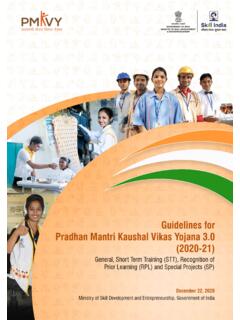Transcription of National Apprenticeship Promotion Scheme - msde.gov.in
1 National Apprenticeship Promotion Scheme What is National Apprenticeship Promotion Scheme ? National Apprenticeship Promotion Scheme (NAPS) is a new Scheme of Government of India to promote Apprenticeship . It was launched on19th August 2016. What are the components of NAPS? The Scheme has the following two components: Reimbursement of 25% of prescribed stipend subject to a maximum of Rs. 1500/- per month per apprentice by the Government of India to all employers who engage apprentices. Reimbursement of cost of basic training ( upto a limit of Rs. 7500/- for a maximum of 500 hours/3 months) by the Government of India to Basic Training Providers (BTPs) in respect of apprentices who come directly for Apprenticeship training without any formal training. Why was NAPS required? To promote Apprenticeship training To incentivize employers who wish to engage apprentices.
2 To increase the engagements of apprentices from present lakh to 50 lakh cumulatively by 2020. Who implement NAPS? Regional Directorates of Apprenticeship Training (RDATs) are the implementing agencies for Central Public Sector Undertakings and those private establishments operating in 4 or more States. State Apprenticeship Advisers are the implementing agencies for State Public Sector Undertakings and Private Sectors establishments in their respective States. What is Apprenticeship training? Apprenticeship training is a course of training in any industry or establishment. Apprenticeship training consists of basic training and on-the-job-training (OJT)/practical training at workplace. What is basic training? Basic training consists of theoretical and practical instructions relating to the trade in which on-the-job-training is to be imparted.
3 It is mandatory for those who have not done any formal training in an ITI or in those courses under PMKVY/MES which have been granted equivalence with basic training. What is the duration of basic training? The duration of basic training is 1/5th to 1/4th of the overall duration of Apprenticeship training. Remaining period will be utilised for on-the-job-training component. Where basic training can be done? Basic training can be done in Basic Training Centre (BTC) which can be set up by the industry/employer where on-the-job-training is to be given, provided the industry/employer has the required facilities/infrastructure for providing basic training. All such BTCs will have to go through a verification process before being designated as a BTC. It can also be provided in government or private industrial training institutes ITIs provided they have spare seats (within overall affiliation) for running basic training.
4 Spare shifts may also be used for basic training. In case these institutes have the required capacity to conduct basic training, they will be designated as BTCs. It can also be imparted in BTCs set up/supported by Industry clusters. What is On-the-job-training? Practical training imparted at workplace in an industry. Who can undergo Apprenticeship training? Any individual, who has completed 14 years of age, is physically fit and having minimum educational qualification prescribed for a trade can undergo Apprenticeship training. Where can Apprenticeship training be undertaken? One can undergo Apprenticeship training in industry/establishments under the Central/State Government or in private sector establishments. Which all sectors are covered under Apprenticeship training? The following sectors are covered under Apprenticeship training.
5 Agriculture and Allied Services Apparel Automobile Aviation Bamboo Jute and Green Technology Banking Financial Service and Insurance Capital Goods Ceramics Chemical Coating and Painting Construction Domestic Workers Electrical (Including New and Renewable Energy) Electronics Entertainment and Media Fabrication Gems and Jewellery Furniture and Fittings IT and ITES Leather Food Processing and Preservation Industrial Automation and Instrumentation Plumbing and Sanitation Technology Refrigeration and Air Conditioning Glass Infrastructure Life Science Marine Healthcare and Wellness Iron & Steel Mining and Minerals Plastics Production and Manufacturing Services including Repair and Maintenance Tourism and Hospitality Rubber Retail and Logistics Soft Skills and Entrepreneurship Textile and Handlooms Security Which all trades are covered under Apprenticeship training?
6 Apprenticeship training can be provided in designated and optional trades. These trades cover all the sectors listed above. What is a designated trade? Designated trade means any trade or occupation as notified by the Government. At present, there are 259 designated trades available for Apprenticeship training. List is available on Apprenticeship portal. What is an optional trade? Optional trade means any trade or occupation decided by an employer. Optional trades can be from the following categories - PMKVY/MES Courses under PMKVY/MES (Prime Minister Kaushal Vikas Yojana/Modular Employable Skills) can be treated as equivalent to basic training component. A one year practical content for on-the-job-training can be designed by the concerned Sector Skill Council (SSC)/NCVT for such courses. Created by employer In a trade decided & designed by employer with a duration of minimum 500 hrs.
7 As basic training component and a one year practical content for on-the-job-training. This option is given to employers to design their own courses relevant to their requirements. All such courses have to be loaded on the Apprenticeship portal. What is the procedure for registration of candidate on the Apprenticeship portal? Candidate may access the Apprenticeship portal How a candidate can undergo Apprenticeship training? Candidate may access the Apprenticeship portal for registration indicating sectors/trades of his choice Search for potential employers Send applications to potential employers for Apprenticeship training, Online receipt and acceptance of offer letters from establishments Process all necessary contractual obligations online. Who is an apprentice? An apprentice is a person who has entered into a contract of Apprenticeship with the employer for Apprenticeship training under the Apprentices Act.
8 When the Apprenticeship training shall be deemed to have commenced? The date on which the contract of Apprenticeship has been entered between employer and apprentice. Is registration of contract of Apprenticeship required? Yes, registration of contract of Apprenticeship is required for designated trades but it is not required for optional trades. However, for getting benefits under NAPS, registration of contract of Apprenticeship for optional trades has been made mandatory. Who registers the contract of Apprenticeship ? Contract of Apprenticeship can be registered by State or Central Apprenticeship Advisers. Contracts are submitted for registration in an online mode and they are approved by the registering authority. What is the procedure for online registration of contract of Apprenticeship ? Candidate applies to an establishment for Apprenticeship training.
9 The establishment views the application of candidate in its MIS account Offers a seat to the candidate. An establishment can contact a candidate on its own also. Candidate receives the offer and accepts it. The acceptance is again reflected in the MIS account of establishment. The establishment approves the accepted offer from the candidate. A contract having a unique contract number is generated between the establishment and candidate. Now the candidate gets the status of an apprentice. This contract of Apprenticeship is now reflected in the account of approving authority for approval. The approving authority approves the contract. What categories of apprentice are covered under the NAPS? Apprentices are covered under NAPS from the following four categories: (i) Trainees passed out from ITI courses (ii) Trainees under dual-learning mode of training from ITIs (iii) Trainees who have completed PMKVY/MES courses (iv) Candidates who possess minimum educational qualification required for a trade and have not undergone any formal training in an ITI/PMKVY/MES these candidates are designated as fresher apprentices.
10 What categories of apprentices are required to undergo basic training? Only fresher apprentices are mandatorily required to undergo basic training. The first two categories of apprentices are exempted from undergoing basic training. Third category of apprentices is also exempted provided that courses under PMKVY/MES are given equivalence to basic training component. What is Pradhan Mantri Kaushal Vikas Yojana (PMKVY)? PMKVY is the flagship Scheme of the Ministry of Skill Development & Entrepreneurship. The objective of this Skill Certification Scheme is to enable a large number of Indian youth to take up industry-relevant skill training that will help them in securing a better livelihood. PMKVY courses are run by Training Partners under the Sector Skill Councils (SSCs) set up by National Skill Development Corporation (NSDC).







